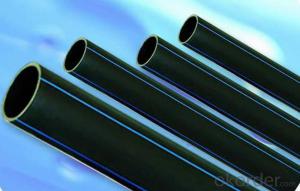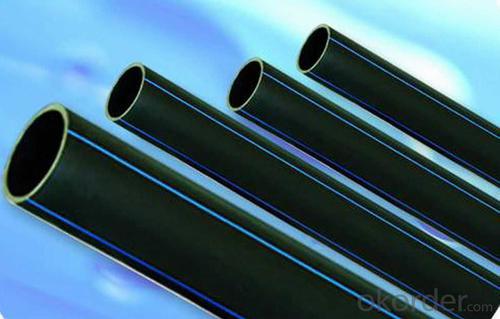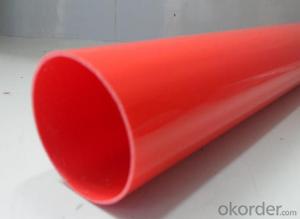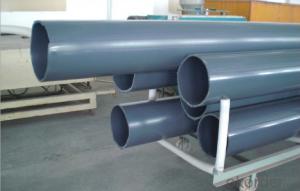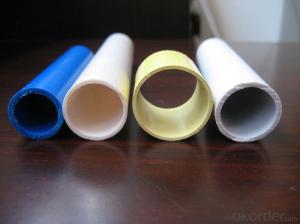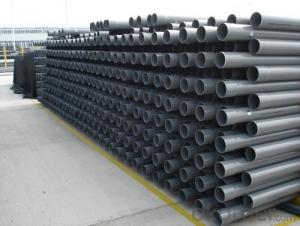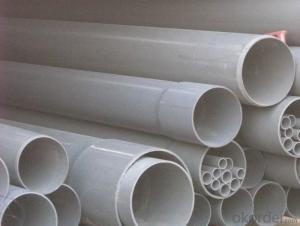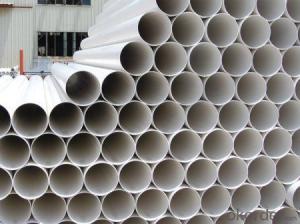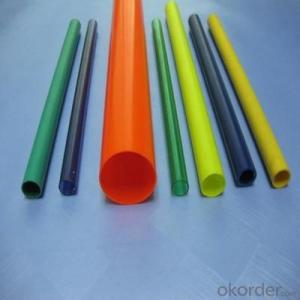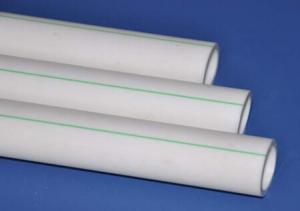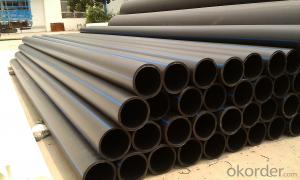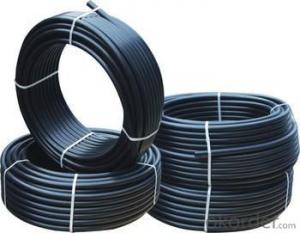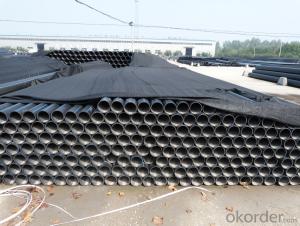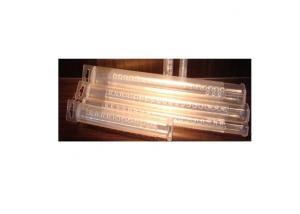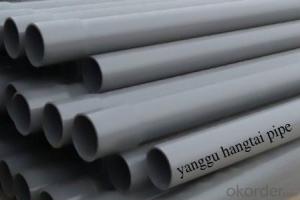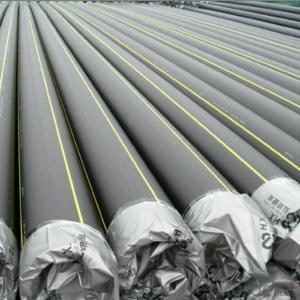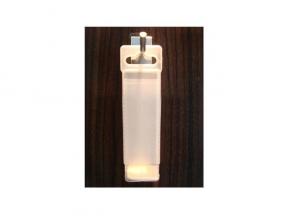HDPE Plastic Tubes ISO4427-1996
- Loading Port:
- China Main Port
- Payment Terms:
- TT OR LC
- Min Order Qty:
- -
- Supply Capability:
- -
OKorder Service Pledge
OKorder Financial Service
You Might Also Like
Physical properties[edit]
Polyethylene is a thermoplasticpolymer consisting of long hydrocarbon chains. Depending on the crystallinity and molecular weight, a melting point and glass transition may or may not be observable. The temperature at which these occur varies strongly with the type of polyethylene. For common commercial grades of medium- and high-density polyethylene the melting point is typically in the range 120 to 180 °C (248 to 356 °F). The melting point for average, commercial, low-density polyethylene is typically 105 to 115 °C (221 to 239 °F).it is transprant.
Chemical properties[edit]
Most LDPE, MDPE and HDPE grades have excellent chemical resistance, meaning that it is not attacked by strong acids or strong bases. It is also resistant to gentle oxidants and reducing agents. Polyethylene burns slowly with a blue flame having a yellow tip and gives off an odour of paraffin. The material continues burning on removal of the flame source and produces a drip.[3] Crystalline samples do not dissolve at room temperature. Polyethylene (other than cross-linked polyethylene) usually can be dissolved at elevated temperatures in aromatic hydrocarbons such as toluene or xylene, or in chlorinated solvents such as trichloroethane or trichlorobenzene.[4]
GB/T13663-2000:
| PE63管材规格 | |||||
| 公称 外径dn,mm | SDR33 | SDR26 | SDR17.6 | SDR13.6 | SDR11 |
| 公称压力 PN,Mpa | |||||
| 0.32 | 0.4 | 0.6 | 0.8 | 1.0 | |
| 公称 壁厚 | 公称 壁厚 | 公称 壁厚 | 公称 壁厚 | 公称 壁厚 | |
| 16 | 2.3 | ||||
| 20 | 2.3 | 2.3 | |||
| 25 | 2.3 | 2.3 | 2.3 | ||
| 32 | 2.3 | 2.4 | 2.9 | ||
| 40 | 2.3 | 2.3 | 3.0 | 3.7 | |
| 50 | 2.3 | 2.9 | 3.7 | 4.6 | |
| 63 | 2.3 | 2.5 | 3.6 | 4.7 | 5.8 |
| 75 | 2.3 | 2.9 | 4.3 | 5.6 | 6.8 |
| 90 | 2.8 | 3.5 | 5.1 | 6.7 | 8.2 |
| 110 | 3.4 | 4.2 | 6.3 | 8.1 | 10.0 |
| 125 | 3.9 | 4.8 | 7.1 | 9.2 | 11.4 |
| 140 | 4.3 | 5.4 | 8.0 | 10.3 | 12.7 |
| 160 | 4.9 | 6.2 | 9.1 | 11.8 | 14.6 |
| 180 | 5.5 | 6.9 | 10.2 | 13.3 | 16.4 |
| 200 | 6.2 | 7.7 | 11.4 | 14.7 | 18.2 |
| 225 | 6.9 | 8.6 | 12.8 | 16.6 | 20.5 |
| 250 | 7.7 | 9.6 | 14.2 | 18.4 | 22.7 |
| 280 | 8.6 | 10.7 | 15.9 | 20.6 | 25.4 |
| 315 | 9.7 | 12.1 | 17.9 | 23.2 | 28.6 |
| 355 | 10.9 | 13.6 | 20.1 | 26.1 | 32.2 |
| 400 | 12.3 | 15.3 | 22.7 | 29.4 | 36.3 |
| 450 | 13.8 | 17.2 | 25.5 | 33.1 | 40.9 |
| 500 | 15.3 | 19.1 | 28.3 | 36.8 | 45.4 |
| 560 | 17.2 | 21.4 | 31.7 | 41.2 | 50.8 |
| 630 | 19.3 | 24.1 | 35.7 | 46.3 | 57.2 |
- Q: How do you dispose of plastic tubes responsibly?
- To dispose of plastic tubes responsibly, it is recommended to check if the tubes can be recycled. If they are not recyclable, they should be placed in the general waste bin. However, it is important to minimize plastic waste whenever possible by opting for reusable or eco-friendly alternatives.
- Q: Can plastic tubes be used for water filtration systems?
- Yes, plastic tubes can be used for water filtration systems. Plastic tubes are commonly used in water filtration systems as they are durable, flexible, and resistant to corrosion. They can efficiently transport water through different stages of filtration, allowing for effective removal of impurities and contaminants.
- Q: There are so many plastic tubes in the beer brewing process, and the cleaner that comes with the kit is not good enough. I was wondering if anyone has any good tips or tricks.
- I bought the special cleaner brush for my kit. It's just a rigid pipe cleaner with a 5 ft flexible handle. It's hard to push it into the center of my line, but that combined with soapy water (remember to rinse well!) does the trick for me.
- Q: What is the level of rigidity of plastic tubes?
- The level of rigidity of plastic tubes can vary depending on the specific type and thickness of the plastic material used. Some plastic tubes can be relatively flexible, while others can be quite rigid and sturdy.
- Q: Is there an instrument for measuring the leakage of underground plastic pipes?
- There are such instruments, but not omnipotent, can solve the problem, depending on the actual scene. In general, Water Leakage big words, instrument can generally be detected, but if it is difficult to guarantee a certain small Water Leakage detected, after all, each device has a predetermined sensitivity, the sensitivity is lower than that of Water Leakage cannot be detected.
- Q: Are plastic tubes resistant to extreme weather conditions?
- Plastic tubes are generally resistant to extreme weather conditions, as they are often made from durable materials such as PVC or HDPE. These tubes can withstand harsh temperatures, UV radiation, and moisture exposure without significant degradation. However, the specific type and quality of plastic used may affect their resistance, so it is recommended to consult the manufacturer or check the product specifications for more accurate information.
- Q: Are plastic tubes suitable for hydrostatic testing?
- Yes, plastic tubes are suitable for hydrostatic testing.
- Q: Are plastic tubes suitable for vacuum applications?
- Plastic tubes are generally not suitable for vacuum applications as they are prone to collapsing under the pressure differential created by the vacuum.
- Q: me and my father were trying to fix a leaf blower(the cord you have to pull will come out but won't go in) and ran into a few problems. we had to pull the whole thing apart to get to it, and along with pulling everything off we had to take off the switches that handle choke and run, and the tubes connected to this device were corroded from gas left in the leaf blower. where can i buy this tubing, and some sealant for the tubes? i DO NOT want a website that i can order them from, i want an ACTUAL store in the Dallas fort worth area.
- Any hardware store. Take a piece of the old with you and be sure to get the right size. Also make sure it is for fuel. They have other plastic tubing that is not for fuel. You shouldn't need a sealant if you get the right size tubing. If you have to run the tubing through the fuel tank as an example, cut the end of the tubing with a razor blade or sharp knife at an extreme angle to make a point at the end of the tube like you would sharpen a pencil. It will go through the hole easier and you can square it off later.
- Q: What are the physical properties of acrylic tubes (18width, 24diameter)? What is the property difference between a tube that is extruded compared to casted? All I'm really asking is which one is stronger and how strong is it? Is it easy to drill holes in them? Is PVC stronger, and what are the properties of that?
- I've no idea what to say
Send your message to us
HDPE Plastic Tubes ISO4427-1996
- Loading Port:
- China Main Port
- Payment Terms:
- TT OR LC
- Min Order Qty:
- -
- Supply Capability:
- -
OKorder Service Pledge
OKorder Financial Service
Similar products
Hot products
Hot Searches
Related keywords
